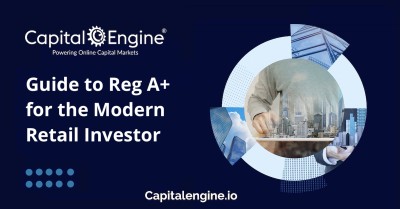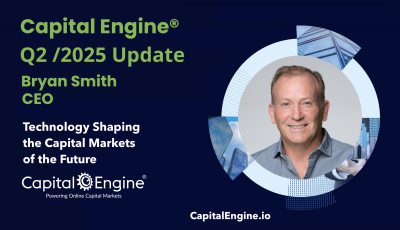THE FUTURE OF PRIVATE CAPITAL MARKETS

For over 75 years, private capital and alternative investment markets like real estate, venture capital, healthtech, renewable energy, social impact and philanthropy (charitable giving) have only been accessible to wealthy individuals, family offices and institutional investors.
Private capital markets are inherently disparate and unstructured with processes that are overly inefficient and often acting as a deterrent that prevents clients and advisors from effectively engaging with relevant investment opportunities. But now, that's changing…
Securities deregulation like the JOBS Act, banking disintermediation and innovative capital raising software like Capital Engine™ are leveling the playing field by giving more people online access to the USD10 Trillion alternative investment market.
The JOBS Act or Jumpstart Our Business Startups Act, is a law intended to encourage funding of small businesses in the United States by easing many of the country's securities regulations. It passed with bipartisan support, and was signed into law by President Barack Obama on April 5, 2012.
Amongst other provisions, the JOBS Act enacted laws democratized investments by opening up the private market to both accredited and unaccredited individuals for the first time since the Securities Act of 1933. These changes were specifically encapsulated in Title II (Rule 506(b) and Rule 506(c)), Title III (crowdfunding) and Title VI (Regulation A+) of the JOBS Act respectively.
Title II Rule 506(b) and Rule 506(c)
In a Rule 506(b) offering, the issuer may take the investor’s word that he, she, or it is an accredited investor.
In a Rule 506(c) offering, on the other hand, the issuer must take reasonable steps to verify that every investor is accredited. The SEC regulations allow an issuer to rely on primary documents from an investor like tax returns, brokerage statements, or W-2s, but they also allow the issuer to rely on a letter from the investor’s lawyer or accountant. In practice, that’s how verification is typically handled.
We strongly recommend that issuers do not verify investors themselves. Instead, they should use a third party like VerifyInvestor. If an issuer handles verification itself and makes a mistake, it’s possible that the entire offering could be disqualified. Conversely, once an issuer hands the task to VerifyInvestor, the issuer has, by definition, taken the “reasonable step” required by the SEC, and can sleep well at night.
In a Rule 506(b) offering issuers can advertise only the brand. In a Rule 506(c) offering issuers can advertise the deal. The model for a website offering investments under Rule 506(b), issuers can advertise the website ("the brand") – but cannot show actual investments.
The website attracts investors who sign up and go through a KYC (know your customer) process following SEC guidelines. The investor completes an online questionnaire, the issuer speaks with the investor on the phone a couple times, learning about his or her experience and knowledge of investing – the issuer develops a relationship. Then, and only then, can the issuer show the investor actual investments.
In contrast, a website offering investments under Rule 506(c) can show actual investments to everyone right away.
Title III (crowdfunding)
Title III allows both accredited and non-accredited investors to participate in a capital raise, but there are limits to how much can be invested. If an individual investor’s annual income or net worth is less than $100,000, the investor’s investment limit is the greater of $2,000 or 5% of his or her annual income or net worth (whichever is lower). If an investor’s annual income and net worth are each $100,000 or more, no more than 10% of his or her annual income or net worth (whichever is lower) can be invested per year. Spouses can calculate their net worth and annual income jointly, but total securities sold to an investor under Title III cannot exceed $100,000 per year, regardless of annual income or net worth.
Under Title III issuers can raise up to $1 million in a 12-month period. Issuers must disclose information about their company, such as the names of the company’s officers and directors, how the proceeds will be used, the target offering amount, the deadline, and certain financial information.
Each regulation crowdfunding offering must be exclusively conducted through one online platform that provides investors with resources and education to ensure that investors are able to make informed decisions. The intermediary operating the platform must be a broker-dealer or a funding portal that is registered with the SEC and FINRA.
Title VI (Regulation A+)
Like an IPO, Reg A+ allows issuers to offer shares to the general public and not just accredited investors. Companies looking to raise capital via Reg A+ will first need to file with the SEC and get approval before launching a mini-IPO. However, the fees associated with a Reg A+ offering are much lower than a traditional IPO and the ongoing disclosure requirements are much less burdensome, effectively making a Reg A+ offering a mini-IPO.
Regulation A+ replaces and expands the seldom used Regulation A by increasing the offering limit under the rule from $5 million to up to $20 million for “Tier 1 Offerings” and up to $50 million for “Tier 2 Offerings.” The regulation also preempts state law review for Tier 2 Offerings, for which the disclosure documents will instead be reviewed by the SEC.
About Capital Engine™
Capital Engine™ is a financial technology company, providing investment professionals and advisors (Funds, 1031 Exchanges, Wealth Manager, Private Banks, Broker Dealers, Sponsors, Family Offices, RIAs, GP/LP and Real Estate Funds) with customized, cross-platform SaaS solutions to power private label Capital Markets (debt/equity) and Alternative Investment platforms, with a strong focus on investor management services and tailored for global business & regulatory needs.
Our business model is to partner with industry experts, in setting up private label investment platforms, online marketplaces and trading exchanges using our software.
Our capital raising solution offers a secure, interactive environment for investors and issuers to connect and exchange information about deals, from online syndication to debt and equity marketplaces, our software can be configured for the appropriate structure and asset class.
Our Capital Engine™ online marketplace is filling a massive gap in the US market in funding Reg D 506 (c) and Reg S based real estate, venture capital, healthcare, renewable energy, impact funding and crypto projects.
Our software helps leverage the opportunity to better originate and showcase a diverse selection of private capital and alternative investment deals and offer these to investors i.e. a deal’s potential viability can be better assessed, market appetite determined and transaction promptly closed.
For more information and/or to setup a demo contact Bryan Smith bryan@capitalengine.io or Request a Demo
Private capital markets are inherently disparate and unstructured with processes that are overly inefficient and often acting as a deterrent that prevents clients and advisors from effectively engaging with relevant investment opportunities. But now, that's changing…
Securities deregulation like the JOBS Act, banking disintermediation and innovative capital raising software like Capital Engine™ are leveling the playing field by giving more people online access to the USD10 Trillion alternative investment market.
The JOBS Act or Jumpstart Our Business Startups Act, is a law intended to encourage funding of small businesses in the United States by easing many of the country's securities regulations. It passed with bipartisan support, and was signed into law by President Barack Obama on April 5, 2012.
Amongst other provisions, the JOBS Act enacted laws democratized investments by opening up the private market to both accredited and unaccredited individuals for the first time since the Securities Act of 1933. These changes were specifically encapsulated in Title II (Rule 506(b) and Rule 506(c)), Title III (crowdfunding) and Title VI (Regulation A+) of the JOBS Act respectively.
Title II Rule 506(b) and Rule 506(c)
In a Rule 506(b) offering, the issuer may take the investor’s word that he, she, or it is an accredited investor.
In a Rule 506(c) offering, on the other hand, the issuer must take reasonable steps to verify that every investor is accredited. The SEC regulations allow an issuer to rely on primary documents from an investor like tax returns, brokerage statements, or W-2s, but they also allow the issuer to rely on a letter from the investor’s lawyer or accountant. In practice, that’s how verification is typically handled.
We strongly recommend that issuers do not verify investors themselves. Instead, they should use a third party like VerifyInvestor. If an issuer handles verification itself and makes a mistake, it’s possible that the entire offering could be disqualified. Conversely, once an issuer hands the task to VerifyInvestor, the issuer has, by definition, taken the “reasonable step” required by the SEC, and can sleep well at night.
In a Rule 506(b) offering issuers can advertise only the brand. In a Rule 506(c) offering issuers can advertise the deal. The model for a website offering investments under Rule 506(b), issuers can advertise the website ("the brand") – but cannot show actual investments.
The website attracts investors who sign up and go through a KYC (know your customer) process following SEC guidelines. The investor completes an online questionnaire, the issuer speaks with the investor on the phone a couple times, learning about his or her experience and knowledge of investing – the issuer develops a relationship. Then, and only then, can the issuer show the investor actual investments.
In contrast, a website offering investments under Rule 506(c) can show actual investments to everyone right away.
Title III (crowdfunding)
Title III allows both accredited and non-accredited investors to participate in a capital raise, but there are limits to how much can be invested. If an individual investor’s annual income or net worth is less than $100,000, the investor’s investment limit is the greater of $2,000 or 5% of his or her annual income or net worth (whichever is lower). If an investor’s annual income and net worth are each $100,000 or more, no more than 10% of his or her annual income or net worth (whichever is lower) can be invested per year. Spouses can calculate their net worth and annual income jointly, but total securities sold to an investor under Title III cannot exceed $100,000 per year, regardless of annual income or net worth.
Under Title III issuers can raise up to $1 million in a 12-month period. Issuers must disclose information about their company, such as the names of the company’s officers and directors, how the proceeds will be used, the target offering amount, the deadline, and certain financial information.
Each regulation crowdfunding offering must be exclusively conducted through one online platform that provides investors with resources and education to ensure that investors are able to make informed decisions. The intermediary operating the platform must be a broker-dealer or a funding portal that is registered with the SEC and FINRA.
Title VI (Regulation A+)
Like an IPO, Reg A+ allows issuers to offer shares to the general public and not just accredited investors. Companies looking to raise capital via Reg A+ will first need to file with the SEC and get approval before launching a mini-IPO. However, the fees associated with a Reg A+ offering are much lower than a traditional IPO and the ongoing disclosure requirements are much less burdensome, effectively making a Reg A+ offering a mini-IPO.
Regulation A+ replaces and expands the seldom used Regulation A by increasing the offering limit under the rule from $5 million to up to $20 million for “Tier 1 Offerings” and up to $50 million for “Tier 2 Offerings.” The regulation also preempts state law review for Tier 2 Offerings, for which the disclosure documents will instead be reviewed by the SEC.
About Capital Engine™
Capital Engine™ is a financial technology company, providing investment professionals and advisors (Funds, 1031 Exchanges, Wealth Manager, Private Banks, Broker Dealers, Sponsors, Family Offices, RIAs, GP/LP and Real Estate Funds) with customized, cross-platform SaaS solutions to power private label Capital Markets (debt/equity) and Alternative Investment platforms, with a strong focus on investor management services and tailored for global business & regulatory needs.
Our business model is to partner with industry experts, in setting up private label investment platforms, online marketplaces and trading exchanges using our software.
Our capital raising solution offers a secure, interactive environment for investors and issuers to connect and exchange information about deals, from online syndication to debt and equity marketplaces, our software can be configured for the appropriate structure and asset class.
Our Capital Engine™ online marketplace is filling a massive gap in the US market in funding Reg D 506 (c) and Reg S based real estate, venture capital, healthcare, renewable energy, impact funding and crypto projects.
Our software helps leverage the opportunity to better originate and showcase a diverse selection of private capital and alternative investment deals and offer these to investors i.e. a deal’s potential viability can be better assessed, market appetite determined and transaction promptly closed.
For more information and/or to setup a demo contact Bryan Smith bryan@capitalengine.io or Request a Demo
Latest Articles





